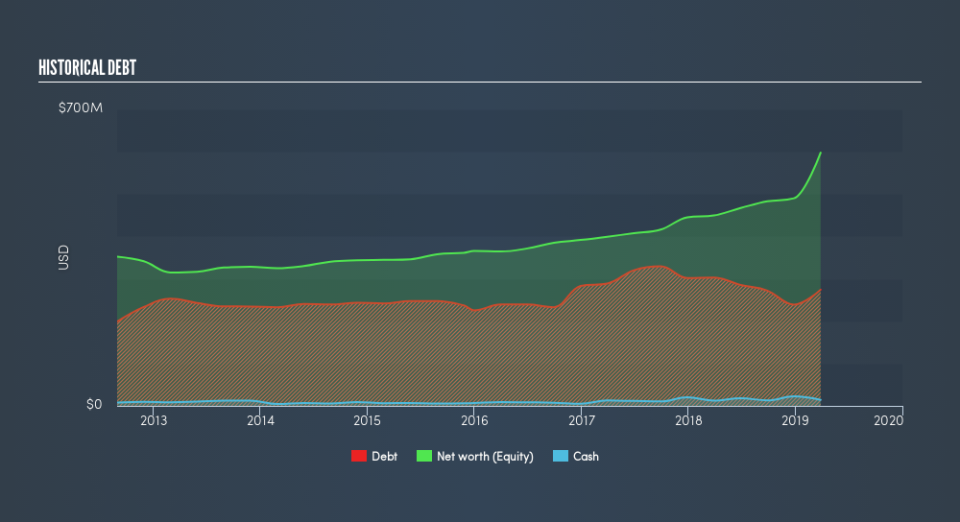Is The Marcus Corporation's (NYSE:MCS) Balance Sheet A Threat To Its Future?

Want to participate in a short research study? Help shape the future of investing tools and you could win a $250 gift card!
Investors are always looking for growth in small-cap stocks like The Marcus Corporation (NYSE:MCS), with a market cap of US$1.0b. However, an important fact which most ignore is: how financially healthy is the business? Evaluating financial health as part of your investment thesis is essential, as mismanagement of capital can lead to bankruptcies, which occur at a higher rate for small-caps. The following basic checks can help you get a picture of the company's balance sheet strength. Nevertheless, this is just a partial view of the stock, and I recommend you dig deeper yourself into MCS here.
Does MCS Produce Much Cash Relative To Its Debt?
Over the past year, MCS has ramped up its debt from US$337m to US$540m – this includes long-term debt. With this rise in debt, MCS currently has US$14m remaining in cash and short-term investments to keep the business going. On top of this, MCS has generated cash from operations of US$133m over the same time period, leading to an operating cash to total debt ratio of 25%, meaning that MCS’s current level of operating cash is high enough to cover debt.
Can MCS pay its short-term liabilities?
With current liabilities at US$145m, the company arguably has a rather low level of current assets relative its obligations, with the current ratio last standing at 0.39x. The current ratio is the number you get when you divide current assets by current liabilities.
Does MCS face the risk of succumbing to its debt-load?
With a debt-to-equity ratio of 51%, MCS can be considered as an above-average leveraged company. This is a bit unusual for a small-cap stock, since they generally have a harder time borrowing than large more established companies. No matter how high the company’s debt, if it can easily cover the interest payments, it’s considered to be efficient with its use of excess leverage. A company generating earnings before interest and tax (EBIT) at least three times its net interest payments is considered financially sound. In MCS's case, the ratio of 6.09x suggests that interest is appropriately covered, which means that debtors may be willing to loan the company more money, giving MCS ample headroom to grow its debt facilities.
Next Steps:
Although MCS’s debt level is towards the higher end of the spectrum, its cash flow coverage seems adequate to meet debt obligations which means its debt is being efficiently utilised. However, its lack of liquidity raises questions over current asset management practices for the small-cap. I admit this is a fairly basic analysis for MCS's financial health. Other important fundamentals need to be considered alongside. You should continue to research Marcus to get a better picture of the stock by looking at:
Future Outlook: What are well-informed industry analysts predicting for MCS’s future growth? Take a look at our free research report of analyst consensus for MCS’s outlook.
Valuation: What is MCS worth today? Is the stock undervalued, even when its growth outlook is factored into its intrinsic value? The intrinsic value infographic in our free research report helps visualize whether MCS is currently mispriced by the market.
Other High-Performing Stocks: Are there other stocks that provide better prospects with proven track records? Explore our free list of these great stocks here.
We aim to bring you long-term focused research analysis driven by fundamental data. Note that our analysis may not factor in the latest price-sensitive company announcements or qualitative material.
If you spot an error that warrants correction, please contact the editor at editorial-team@simplywallst.com. This article by Simply Wall St is general in nature. It does not constitute a recommendation to buy or sell any stock, and does not take account of your objectives, or your financial situation. Simply Wall St has no position in the stocks mentioned. Thank you for reading.

